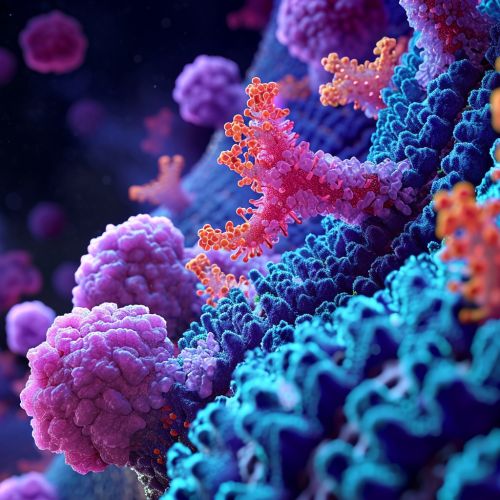Janus kinase
Overview
Janus kinases (JAKs) are a family of intracellular, non-receptor tyrosine kinases that transduce cytokine-mediated signals via the JAK-STAT pathway. Named after the two-faced Roman god of beginnings, gates, transitions, time, duality, doorways, passages, and endings, Janus kinases have two near-identical phosphate-transferring domains. One domain exhibits the kinase activity while the other negatively regulates the kinase activity of the first.


Classification
There are four members in the Janus kinase family: JAK1, JAK2, JAK3, and Tyk2. Each of these proteins has a unique pattern of expression in cells and tissues. JAK1 and JAK2 are found in many types of cells, while JAK3 is primarily found in hematopoietic cells, and Tyk2 is less widely expressed.
Structure
Each Janus kinase has a common structure: a FERM domain at the N-terminus, followed by an SH2-like domain, a pseudokinase domain, and a kinase domain at the C-terminus. The FERM and SH2-like domains are involved in the binding of JAKs to cytokine receptors. The pseudokinase domain negatively regulates the activity of the kinase domain.
Function
Janus kinases play a critical role in signal transduction from the cell surface to the nucleus. They are activated by a wide range of cytokines, growth factors, and hormones. Upon ligand binding to the receptor, JAKs phosphorylate and activate Signal Transducers and Activators of Transcription (STATs) which modulate cellular activities.
Role in Disease
Mutations in the genes encoding Janus kinases have been associated with a variety of diseases. For example, mutations in JAK2 are associated with myeloproliferative disorders, while mutations in JAK3 can cause severe combined immunodeficiency.
Therapeutic Target
Given their role in disease, Janus kinases are targets for therapeutic intervention. Several JAK inhibitors, such as tofacitinib and ruxolitinib, have been approved for the treatment of diseases like rheumatoid arthritis and myelofibrosis, respectively.
See Also
Cytokine Receptors Signal Transducers and Activators of Transcription (STATs) Tyrosine Kinase Inhibitors
